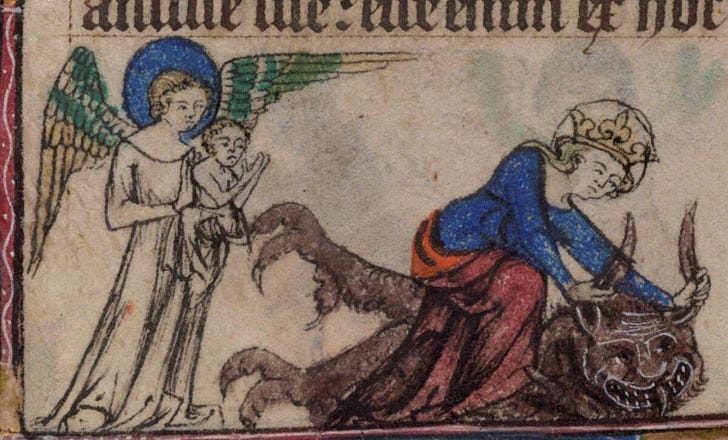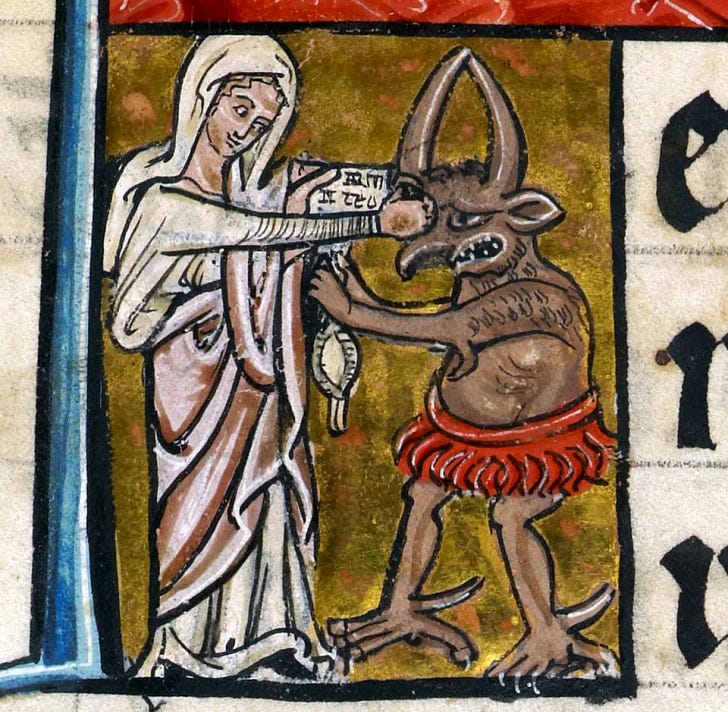
I mentioned in my previous installment of Lex Orandi that my next piece would unpack what the Church Fathers (the earliest Christians) said about apostolic succession, the Eucharist, and other essential Catholic doctrines. Well, I lied. That’ll be my next next installment. For this shorter one, I want to be annoyingly seasonal. 🎃
This is part of a series. If you haven’t yet, read the first two installments:
I’m writing this whole series somewhat as the Spirit leads, which means it’s not necessarily in the chronological order of my discernment and ultimate conversion. Apostolic succession really was the hinge-point topic for me, since it all has to do with authority—and I’ll continue to explain and define what that meant for me—especially because I realized that if I found confident reasons to affirm that the Catholic Church was indeed the one Church founded by Jesus himself, all the other “weird Catholic stuff” was extra. I could still find it all weird, I could still question its validity (questions were welcomed, actually!), and I could still wrestle with the idea that those doctrines were, in fact, correct, but if this Church was legitimately THE Church, then hey—I could at least assent to its authority while questioning the finer points.
But to diverge for just a moment on the fundamental issue of authority and instead dip a toe into the “weird waters” in light of this week being All Hallow’s Eve… It was farther along in my discernment journey when I realized that whenever there are accounts of serious a demonic presence, it’s always the Catholic priests who are brought out as the big guns.

Truly. There are stories of Protestants and Orthodox Christians who fight demonic influences, yes, but whenever there’s a serious issue of a real, legit possession or infestation, it’s always the Catholic Church that’s called in. And not just in movies.
It was a simple realization for me, but a pretty important one: If Satan and his demonic powers recognize the Catholic Church as legit, why wouldn’t I?
Side note: I went through a brief stage in my later evangelical years questioning all that “demonic stuff,” toeing the line in the middle of what’s literal and what’s imaginative, figurative language—but it seemed like most of the intelligent Christians throughout history that I admired really recognized the reality of invisible powers of good and evil. Why would I be smarter than them? I eventually assented.
There’s no way I have the authority nor time to unpack all that’s behind the idea of real, legit demonic powers, exorcisms, and other forms of calling out powers of evil in the name of Christ—so I’ll let others do it (ignore any tacky sensational-looking thumbnails):
Some of these interviews and stories are spooky, but they’re legit, and they’re most definitely worth listening to. Don’t shy away. Listen with the simple posture of curiosity, and with a willingness to learn something unexpected. I know I don’t seem like the type to link to or recommend these sorts of things… That should pique your awareness all the more.
I’ll write more again soon unpacking the foundational issues that led me from a lifetime of evangelical Protestantism, to Anglicanism, to finally Catholicism—but in the meantime, as always, here are the key resources that helped me on my years-long journey:
Evangelical Exodus: Evangelical Seminarians and Their Paths to Rome, by Douglas Beaumont
Why I Am Catholic (and You Should Be, Too), by Brandon Vogt
Stunned by Scripture: How the Bible Made Me Catholic, by John Bergsma
When the Church Was Young: Voices of the Early Fathers, by Marcellino D'Ambrosio
Trent Horn’s Counsel of Trent episodes
Fr. Mike Schmitz’s Ascension Presents episodes
Super glad a Catholic priest has blessed our house,
Tsh


